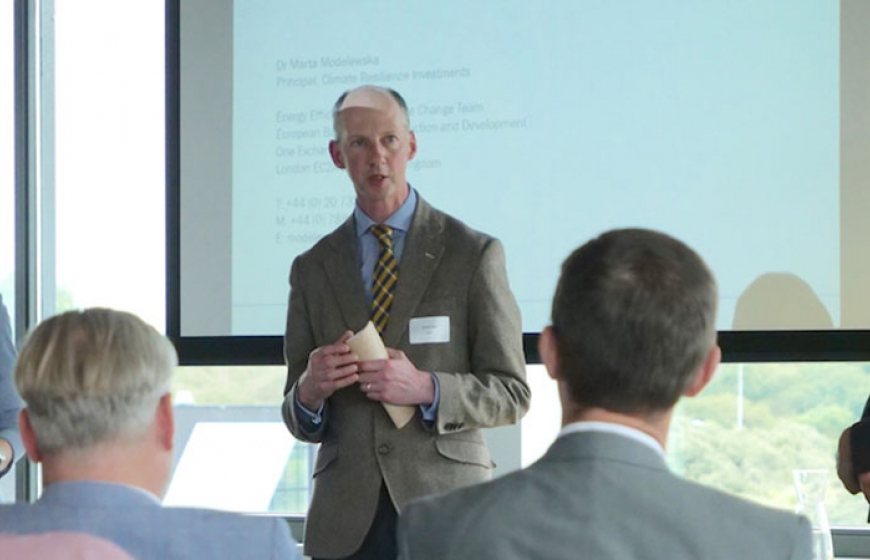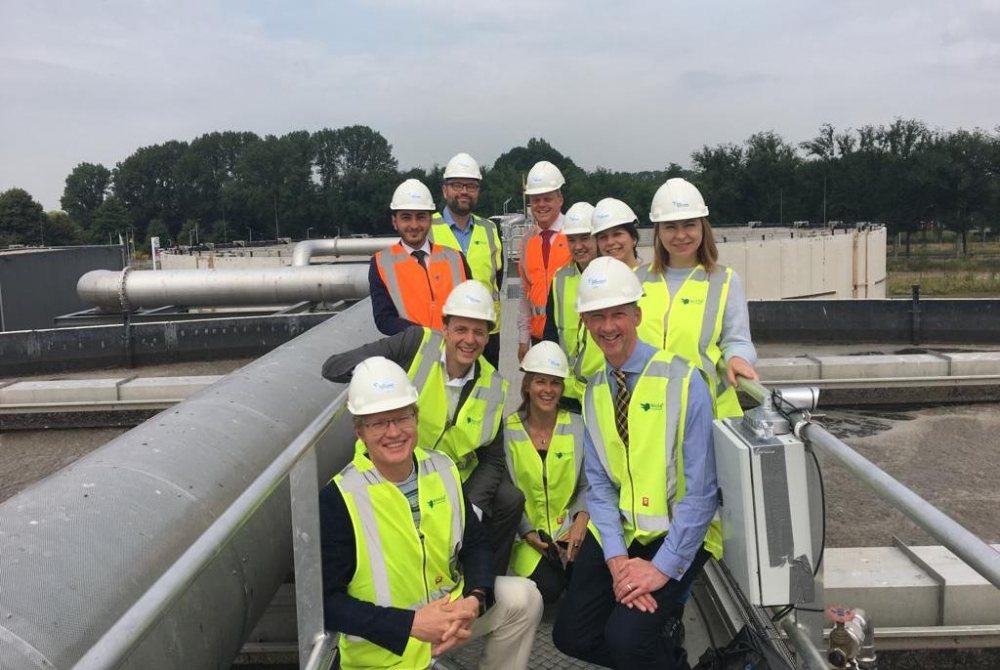
‘Water scarcity is one of the most acute issues for European Bank for Reconstruction and Development (EBRD) countries, especially those in the Southern Mediterranean and Central Asia. Looking for innovative ways to address the challenge, the EBRD turned to its shareholder countries with strong water and climate resilient expertise.'
Water and climate resilience
'The worsening water situation in the countries in which the EBRD operates provides an opportunity for the private sector to create financial value by addressing the challenges head on. Potential synergies between the Dutch water sector and the EBRD are strong. Dutch companies already work in highly water stressed EBRD countries such as Jordan and Egypt.
The EBRD delegation consisted of seven water and climate resilience professionals who, on the first day, received a warm welcome and attended a presentation by Ger Pannekoek of the Netherlands Water Partnership (NWP), the host during this study tour. Delegates learned about the importance of building strong partnerships between academic institutions, non-governmental organisations (NGOs), governments and the private sector. NWP mobilises all these stakeholders to meet the ambitions of the Dutch international water sector as well as national strategies in terms of climate adaptation and water management.'
Study tour highlights
'There were several highlights during the study tour. One of these was a presentation by Martien Beek, Strategic Advisor to the Delta Commissioner, who outlined the importance of climate resilience in a country where 60% of the population lives in flood prone areas and 65% of the GDP is exposed to flood risk. His presentation was a great opportunity to learn about the Netherlands’ adaptive approach to climate action to handle water problems, heat stress, drought and the effects of extreme weather events.
Irene Pohl of REBEL gave insights on the climate resilience cost benefit analysis tool that the company created. A tool like this is very useful in the context of the development of a more objective climate resilience strategy as it allows decisions made on prioritising measures and investments to be based on quantified impacts and overall benefits.
Hans Peter van Schooneveld, the pioneering architect in the town of Heerhugowaard, presented what is the first CO2 neutral residential area in the world. It is a great example of the integration of renewable energy in urban design, flexible urban planning, as well as the use of natural green infrastructure for storm water purification and climate resilience.
The delegation visited the Marineterrein Smart Roof 2.0 where they were welcomed by Steven van Rossum, Managing Director of World Waternet, as well as Janette Worm, Regional Director for the Middle-East. Gijsbert Cirkel, a Senior Scientific Researcher at KWR Water Research Institute, presented the Smart Roof 2.0 solution which demonstrates how green roofs both cool buildings and store rainwater. This reduces energy usage for cooling and the impacts of severe weather related urban flooding.

On day two, the delegation had breakfast with Menno Holterman and his team during which he presented Nijhuis Industries’ impressive waste and waste water portfolio of novel solutions. Beyond its technologies, the delegation was particularly impressed by the company’s vision and maturity in embracing the Sustainable Development Goals (SDGs) and key concepts such as the circular economy, a vision that is also aligned with the EBRD’s strategies and values.
The delegation also met Kees Lakerveld, Debby Berends, and Tom Woolley from Royal HaskoningDHV during a field visit to a Utrecht waste water treatment plant. The HaskoningDHV team demonstrated the Nereda advanced waste water treatment technology that uses the unique features of aerobic biomass. They also demonstrated the Aquasuite solution. This technology uses artificial intelligence to better predict demand and thereby address non-revenue water, and machine learning to manage water networks.
The last stop was at Dunea where Wim Drossaert, the CEO, hosted a plenary session with various stakeholders from the Dutch Water Sector. During the plenary, NWP’s Director Bianca Nijhof talked about the Dutch water sector’s engagement with the EBRD.'
Networking
'The study tour concluded with a successful networking event facilitated by NWP where the delegation enjoyed a drink and learned about the exciting research conducted by water centres of excellence such as Deltares and KWR, while strengthening ties with all the organisations met during the study tour. The delegation was pleased that NWP members could also join to give an impression of the expertise that lies within its network.
In conclusion, the study tour was a great introduction to the ‘Dutch Approach’ to tackling water and climate resilience issues. This approach is based on a proactive attitude towards challenges that make the Netherlands a resilient and entrepreneurial nation.’
Do you want to learn more about the EBRD study tour and its programme? Contact Lisanne Evenhuis, l.evenhuis@nwp.nl.